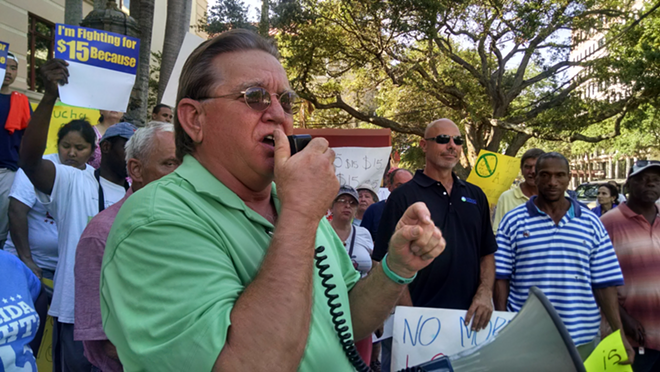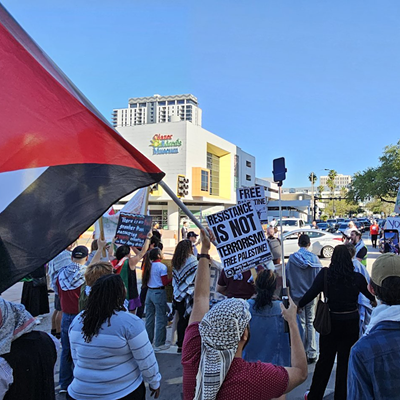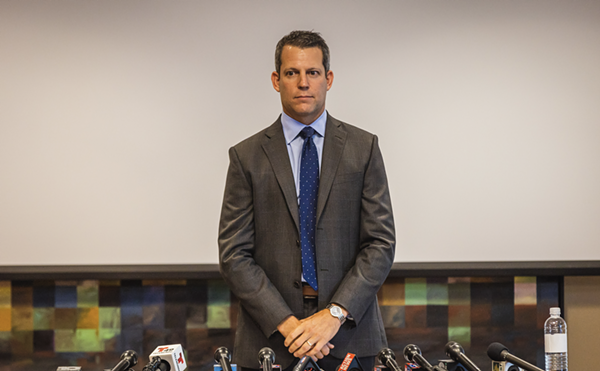
Today marks the culmination of the multifaceted movement pushing for an increase in the minimum wage to $15. Member of the group Fight 4-15 and members of unions and other allied groups are demonstrating and marching throughout the Tampa Bay area, beginning before dawn at various fast food restaurants and ending later today with a march near USF.
The crowd that gathered near the entrance of St. Pete City Hall this morning comprised people from a wide range of backgrounds, each of whom had the common interest of raising the minimum wage to, of course, $15 an hour. They say that's the right amount to lift people out of poverty, which would reduce reliance on government programs like food stamps and other assistance for fast food and home health workers as well as adjunct instructors at colleges and universities.
Anne Buckner, a home health care worker, was among the speakers. She said she's paid $10 an hour with no benefits, vacation, sick time or overtime pay. She works 120 hours a week for seven different agencies caring for patients, bathing them, taking them grocery shopping, taking them to doctor appointments and even doing some light housekeeping.
"I have no life because I'm working," she said. "I can't enjoy the things I like to do, like other people do, because I'm caring for others."
In some cases, said Ashley Green, a member of the Bay Area Activist Coalition, Black Lives Matter and numerous other groups, the desperation some experience trying to survive and feed a family on a part-time $9 an hour job can lead to small crimes like theft and drug dealing, roping many low wage workers (particularly in African-American communities) into a cycle of court fines and jail time they can't escape. That leads to tension with police, she said, and ultimately violence.
"There's been death after death at the hands of police that has really galvanized us out in the streets," she said. "Stop...criminalizing and blaming people for what they do to feed their kids and themselves. If they're working and can't take care of themselves and you see people that you care about hungry and don't have a place to live, people act out of desperation sometimes. And that's become and excuse to criminalize and hunt us down in our own communities. And it's become an excuse to treat every black person and a lot of brown and a lot of Hispanic people as criminals on site because of the conditions that we have to live in when we don't get paid enough to live."
The most dramatic speaker at the event was child care worker Nadaije Paul Jajoute, who earns just over $8 an hour.
"I have no children, nor am I married, but I am not able to take care of myself as a single adult," she said. "I cannot afford to live on my own or move out. I've been homeless, I've sleet in my car, I've worked in retail, I've worked in childcare, and it is a shame. I've even worked for the city."
She said the city, which recently raised its minimum wage to $12.50 an hour, ought to lead by example and bump its starting wage to $15 an hour.
"These steps, these buildings, who built it? Who pays the taxes? It is the workforce that pays the brunt of taxes," Jajoute said, reaching into her pocket and pulling out a clump of dirt and grass. "This is the soil of St. Pete, right here. Here is the soil...This is your soil...yet it is denied to you by our officials, by our CEOs, buy company holders. We are all in this fight, along with franchise owners. It is being done to them, too."
A number of public officials spoke as well.
St. Pete is on the verge of passing a wage theft ordinance tomorrow, which supporters say goes hand-in-hand with a minimum wage increase, given that it serves to make sure that minimum wage workers actually get paid. Osceola County Commissioner Michael Harper, who, along with a supermajority of his colleagues, recently passed a wage theft ordinance similar to the one St. Pete passed yesterday.
"For too long in this country, our labor have been commoditized down to the cheapest thing that we can do," he said. "And I, for one, am over that. Not only [is] our labor cheap, but we have unscrupulous employers, who, after you've worked hard for that day, they choose not to pay you."
St. Pete City Councilwoman Darden Rice, who proposed St. Pete's version of the ordinance, spoke about why the city needs it.
"We know, just from the paltry data there is, we know that $15,000 Pinellas County residents between 2012 and 2014, 15,000 residents filed wage theft claims at about an average of $500 claim, totaling $7.5 million. Now, that was just the tip of the iceberg. We know that there's likely to be two or three times more wage theft taking place. And guess what? That's money that could be circulating in the local economy. But even more than that, that's money that belongs in the pockets of the people who earned the money in the first place."
Similar demonstrations are taking place in 236 U.S. cities and 123 additional cities across the globe. Locally, protestors will also demonstrate at Tampa's Copeland Park today starting at three, then will march down Fowler Avenue.
















